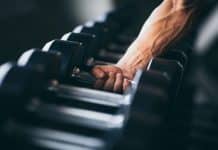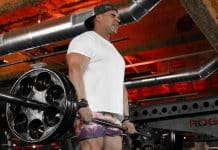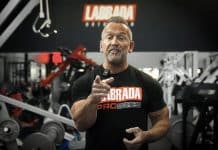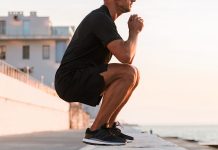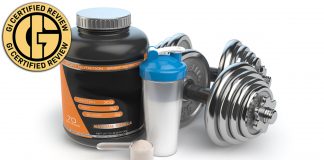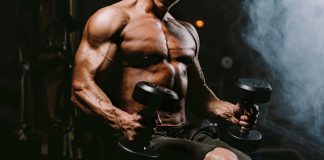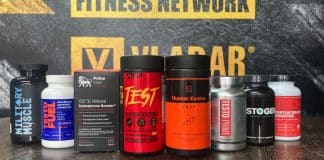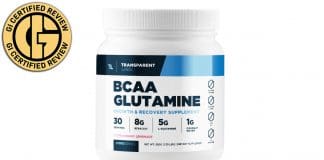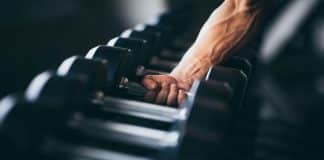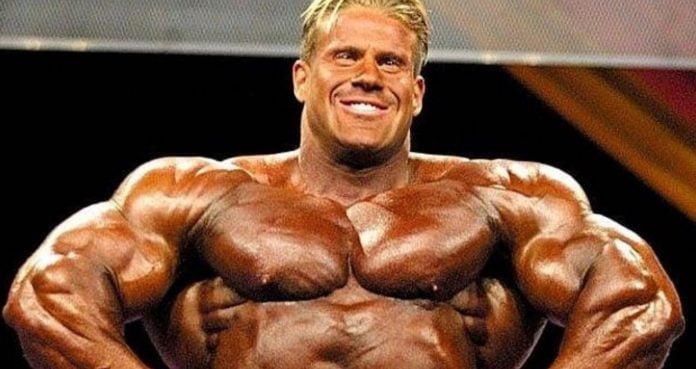
IFBB Pro bodybuilder Jay Cutler names the 3 hardest exercises for ab development.
Shredding fat from your midsection is where guys struggle the most to lose fat. That’s because men store most of their fat in their abdominal region. When guys start shredding, they’ll usually notice fat loss everywhere else before their stomach. If you’re looking for a six-pack abs, you’re in good hands because 4x Mr. Olympia Jay Cutler shared the 3 best ab exercises for sculpted abs.
Jay Culter formed a fierce rivalry with 8x Mr. Olympia Ronnie Coleman—whom he recently joined forces to undergo a demanding back and biceps workout—and won Olympia in 2006, 2007, 2009, and 2010. Cutler has fortunately remained relatively healthy after his retirement. He has continued working out and is sharing his workout routines and top exercises on social media. Recently, Cutler sat down to discuss his steroid cycle on the Cutler Cast podcast, where he says he’s still injecting 200 mg of testosterone per week.
| Full Name: Jay Cutler | ||
| Weight | Height | Date Of Birth |
| 265-275 lbs. | 5’9’’ | 08/03/1973 |
| Division | Era | Nationality |
| Men’s Open | 1990, 2000, 2010 | American |
3 Best Ab Exercises According to Jay Cutler
View this post on Instagram
Jay Culter says the 3 exercises that benefit your abs the most are sit-ups, rope crunches, and hanging leg raises. Cutler stated:
“Abs aren’t made only in the kitchen. They are also made in the gym.”
He added:
“These are the hardest, but they bring out the most abs. Focus on 15 to 20 repetitions. Remember, weights aren’t always needed for these movements.”
Sit-ups
For one of Cutler’s top 3 ab exercises, he included probably the most classic ab exercise, sit-ups. This is a pretty simple movement. The sit-ups are done from the ground. You’ll lie your back on the floor (preferably a padded mat or yoga mat) with your legs bent and feet firmly placed on the ground. Then, with your arms by your side or behind your head, you’ll lift your torso as far as possible. You can add a dumbbell or plate to this exercise to make it more challenging.
This exercise strengthens your core—rectus abdominis (primarily), transverse abdominis, oblique, and hip flexors.
Rope Crunches
Rope crunches is another ab exercise that made Cutler’s top 3 ab development list. As the name suggests, this exercise is a crunch performed with a cable rope. The crunches are similar to sit-ups except that you don’t bring your torso as far up from the ground. This doesn’t target as many muscles in your core or bring them through as much range of motion. But it does keep more tension in your abdominal muscles.
While a standard crunch will have you perform them on the floor, the rope crunch is performed on your knees with a cable machine. This will enable you to add resistance to your abs, strengthening them.
Hanging Leg Raises
The hanging leg raises are another bodyweight movement exceptional for targeting your abs, especially your lower abs. So it’s no surprise that Cutler included these ab movements in the top three list.
This movement requires you to hang your entire bodyweight from a bar and then lift your legs in a slow and controlled manner (while straight) until your body forms a 90-degree angle. You can add resistance to this exercise by holding a dumbbell between your feet. A modified version of this exercise would be performing captain’s chair hanging leg raises.
According to Jay Cutler, weights aren’t always needed when training your abs. And he recommends that you stick in the 15-20 rep range.
Example Workout
Here’s an example workout with Jay Cutler’s top 3 ab movements.
| Exercises | Sets | Reps |
| Sit-ups | 4 | 15-20 |
| Rope Crunches | 3 | 15-20 |
| Hanging Leg Raises | 3 | 15-20 |
Benefits of Abs
Ab muscles are a great way to improve your physical fitness. The ab muscles can help to improve your posture, reduce lower back pain, and increase athletic performance, among other benefits.
Reduce Lower Back Pain
Lower back pain is one of the most common types of pain, so it’s no surprise that this area is where many people develop trouble. The abs are connected to your lower back, so strengthening your ab muscles can help prevent lower back pain (1).
Reduce the Risk of Hernia
The ab muscles support your spine, a vital part of your body’s overall structure. If you have weak abdominal muscles and back pain, or if you’ve been diagnosed with an inguinal hernia (a weakness in the abdominal wall), then strengthening your abs will help prevent further damage to your back.
Improve Posture
For some, improving their posture is a matter of vanity. For others, it’s about enhancing overall health and wellness. Whatever your reason for wanting to improve your posture, there are plenty of benefits to be had from it.
- Better breathing
- Less back pain
- Improved circulation and organ function
Improving your posture can help you live a healthier, more active life and make you feel more confident.
Improve Athletic Performance
Strong abs are an important part of a strong core. When you have strong abs and a strong core, you can move more efficiently in sports like soccer or basketball because you can generate power more quickly than someone with weak abdominal muscles.
The ability to generate power quickly is especially important when running because speed is a big factor in how fast someone can run a race or compete on the track field (or court). If you have weak abs, you won’t be able to keep up with the rest of your body when it comes time for them to work together during activities like sprinting or throwing a ball as far as possible (2).
Better Balance
To maintain balance, you need to engage your core muscles. The abs are a big part of that, which is why they’re so important for keeping you steady as you go about your day. If you want more stability, try doing the abovementioned ab exercises. These exercises strengthen your core, helping them work together to help with balance.
More IFBB Pro Workouts
If you learned something from Jay Cutler’s favorite 3 ab exercises, check out other workout tips from IFBB Pro bodybuilders below.
- IFBB Pro James Hollingshead Shares 3 Must Do Leg Exercises
- 4x Mr. Olympia Jay Cutler Shares 6 Exercises for Massive Arm Growth
Follow us on Instagram, Facebook, and Twitter for more workout tips from IFBB Pros!
References
- Coulombe, B. J., Games, K. E., Neil, E. R., & Eberman, L. E. (2017). Core Stability Exercise Versus General Exercise for Chronic Low Back Pain. Journal of athletic training, 52(1), 71–72. https://doi.org/10.4085/1062-6050-51.11.16
- Luo, S., Soh, K. G., Soh, K. L., Sun, H., Nasiruddin, N. J. M., Du, C., & Zhai, X. (2022). Effect of Core Training on Skill Performance Among Athletes: A Systematic Review. Frontiers in physiology, 13, 915259. https://doi.org/10.3389/fphys.2022.915259


